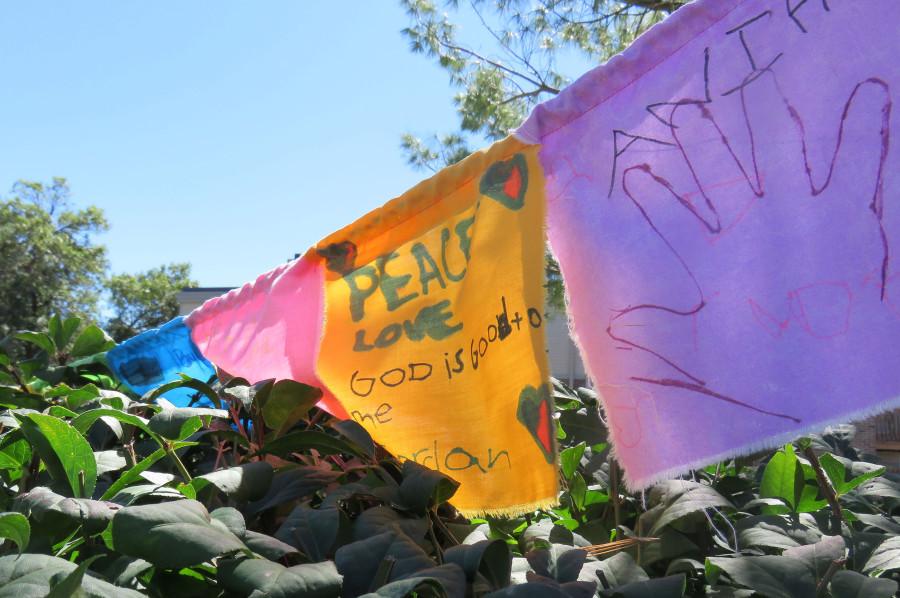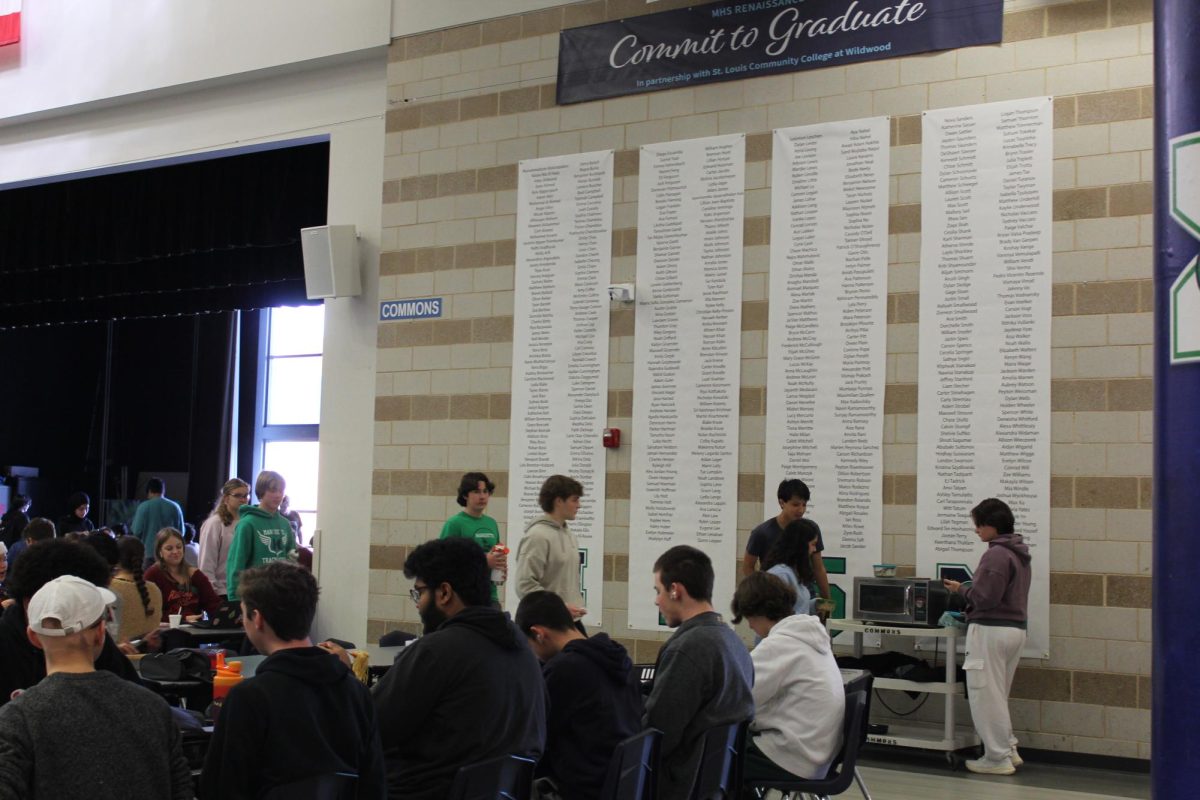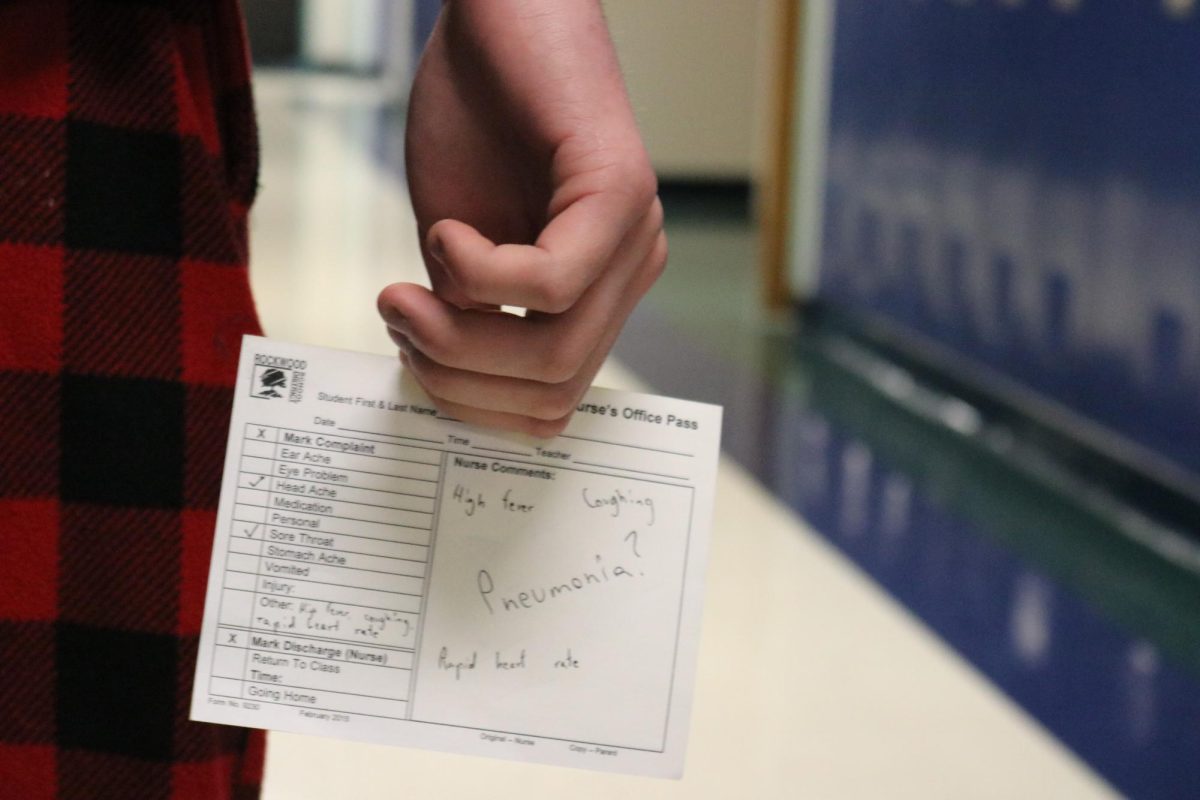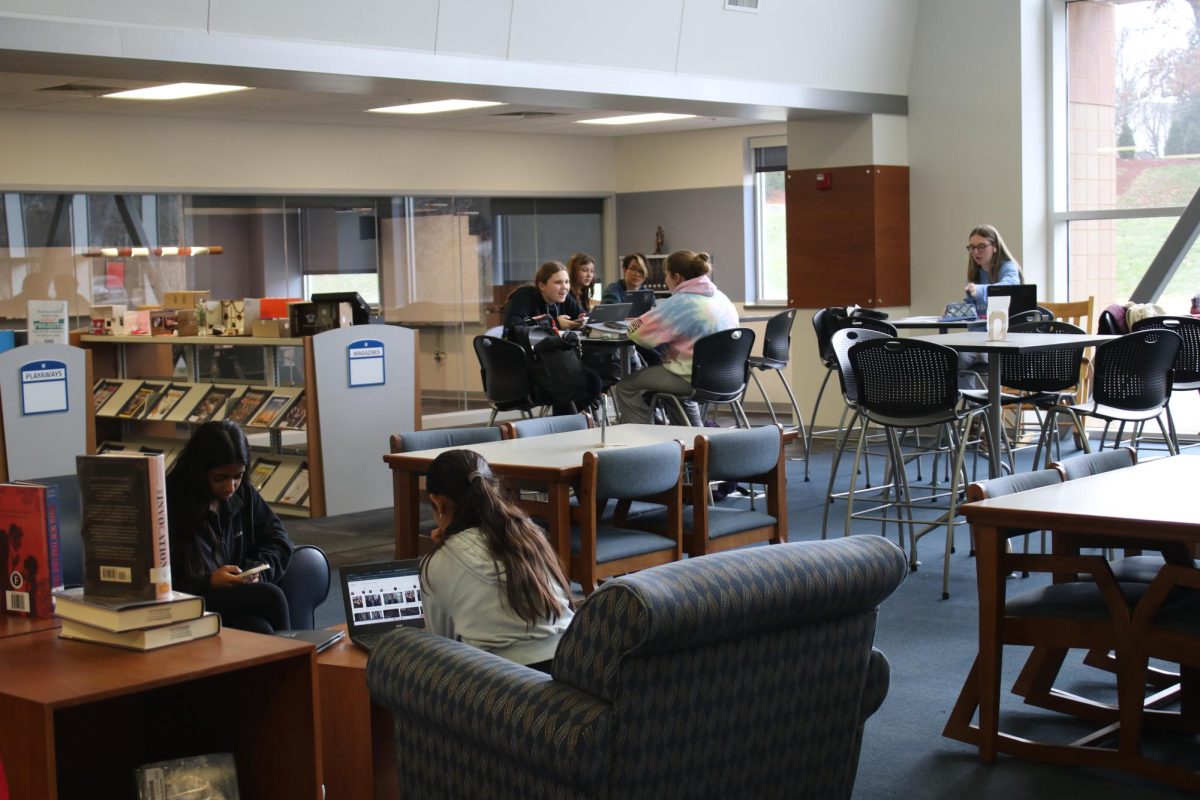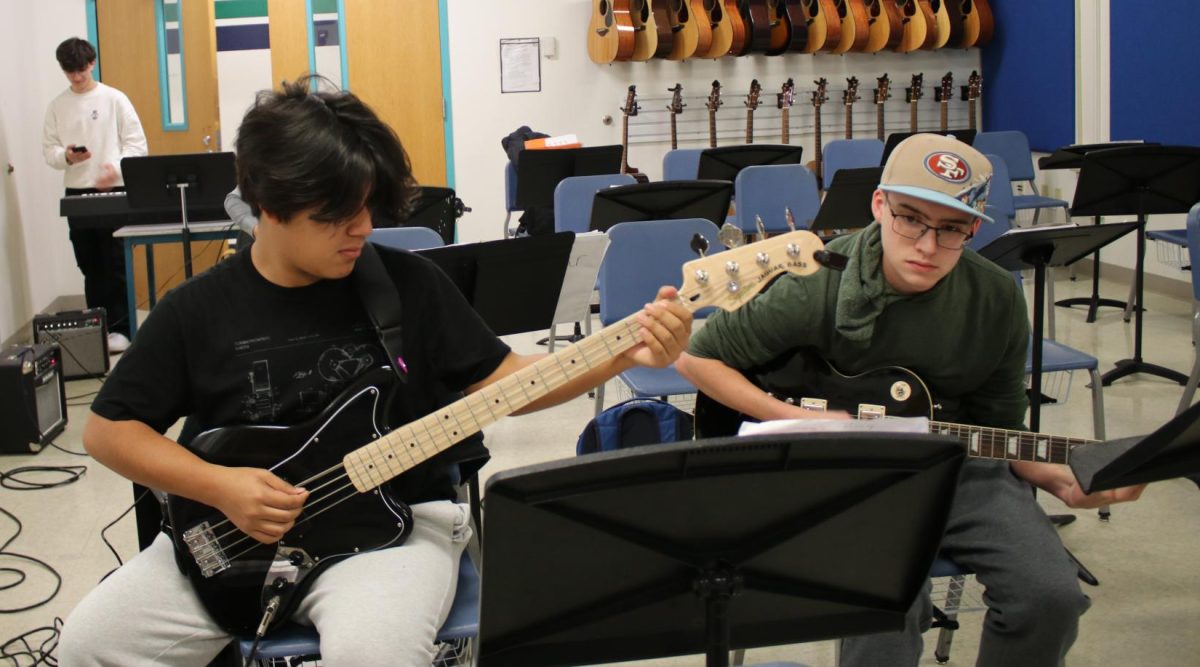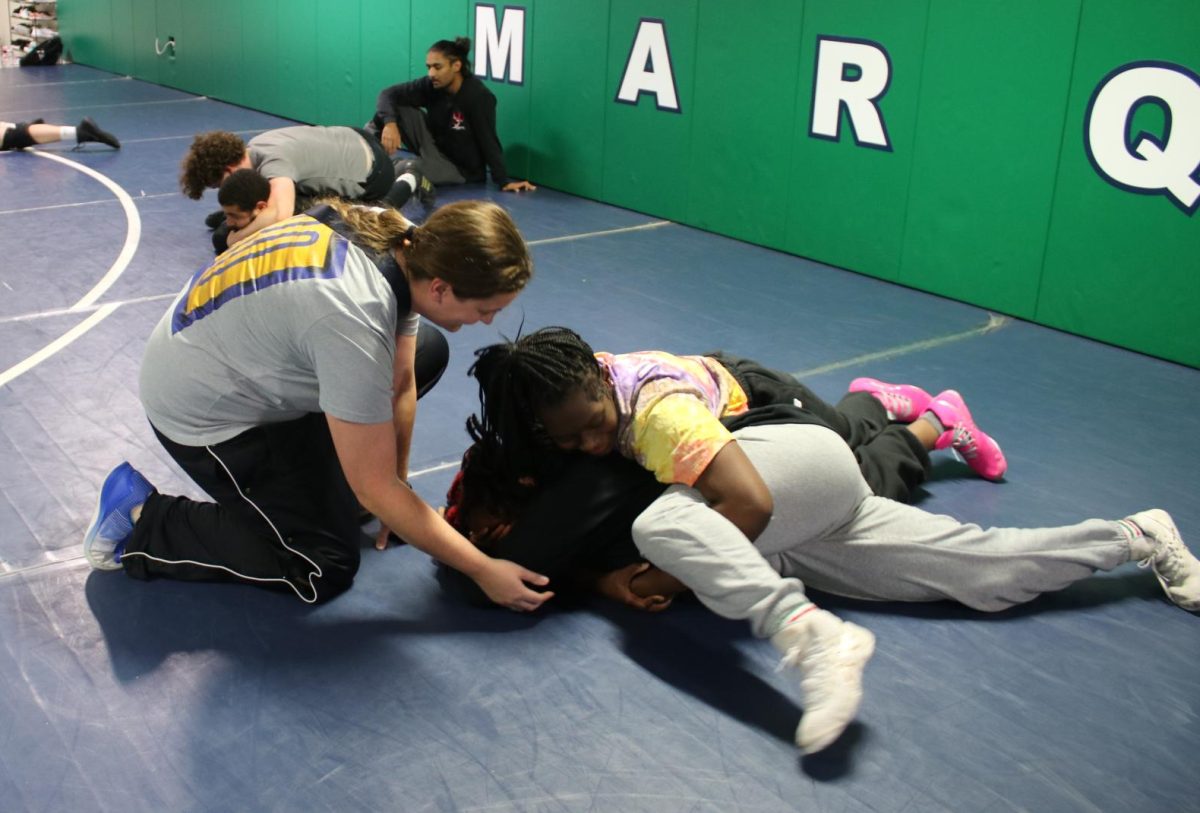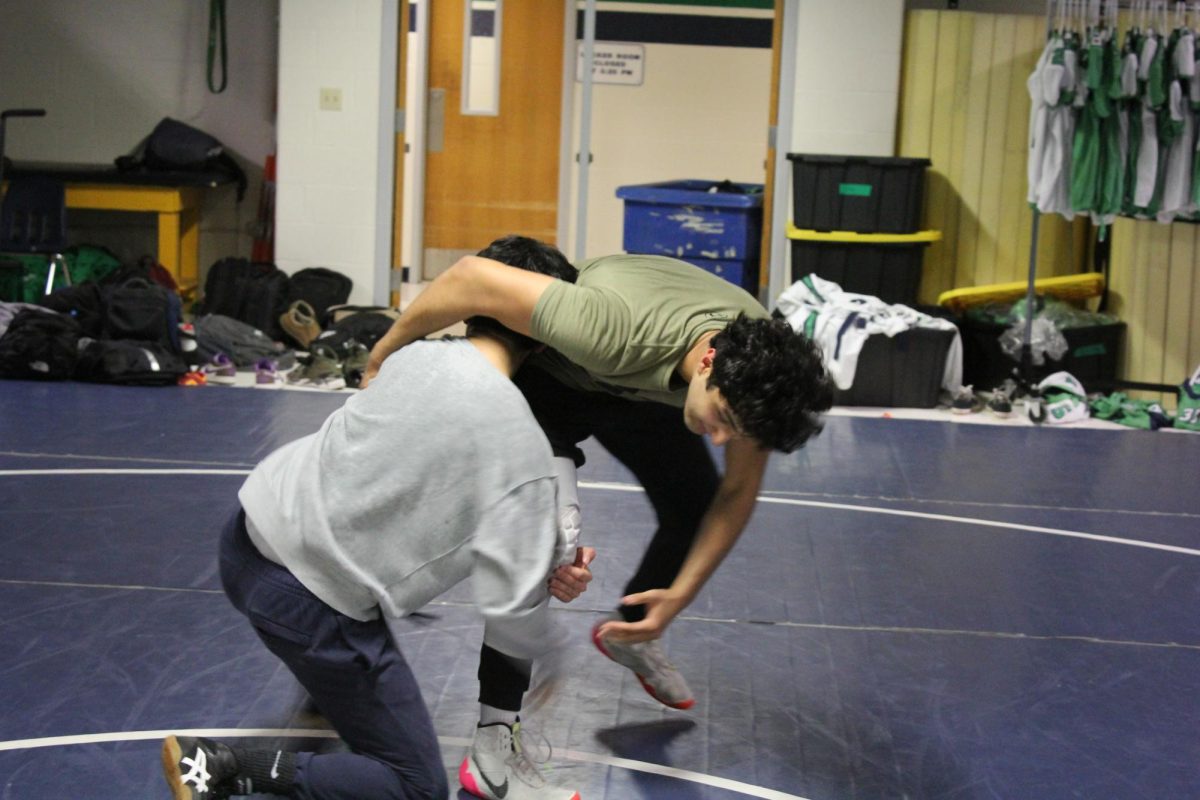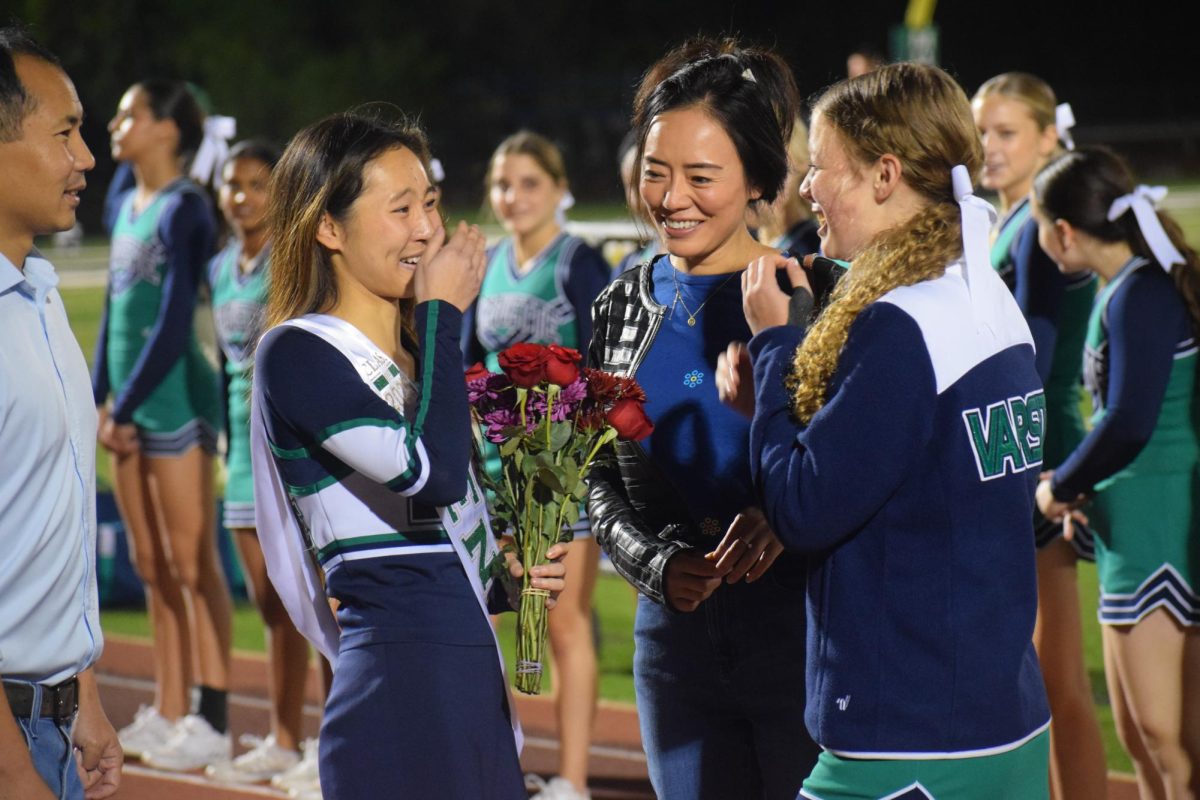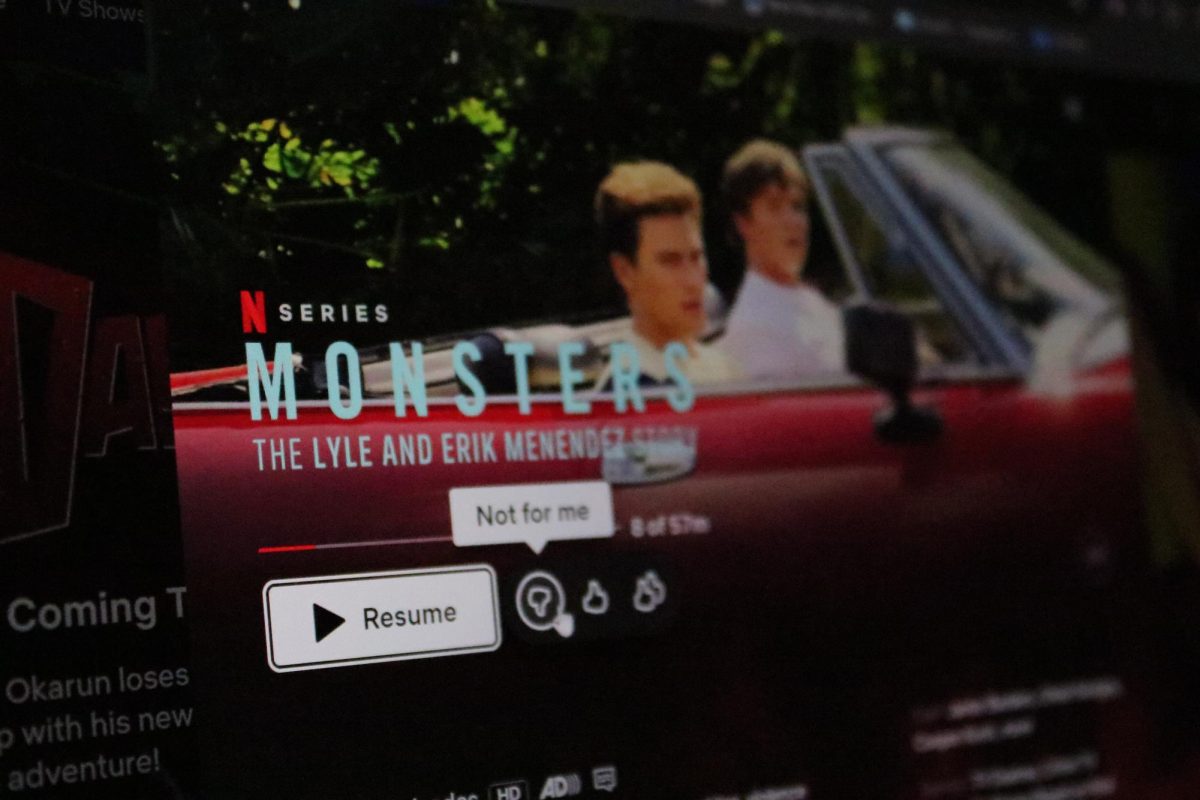Conflict in Ferguson
Since the death of Micheal Brown, a black teenager, at the hands of a white, Ferguson police officer on Saturday, Aug. 9, news and social media outlets have released a constant steam of information about he resulting events. They leave a lasting impression on MHS, Rockwood and the community as a whole.
Media by Catie Lambert
Hand-made banners promoting peace and community line a bush beside the site of Micheal Brown’s death. A sprawling memorial with signs and objects in honor of Brown have been erected along the street.
September 15, 2014
Awareness
In response to recent events in Ferguson, Dr. Clarissa Rile Hayward, professor of political science at Washington University, said high school students need to become politically knowledgeable and open to other people’s opinions.
“All of you will be of voting age in the next four years, so I think one of the most important things you can do is to become politically informed and become politically active,” Dr. Hayward said.
MHS students should care about what happens in Ferguson because they aren’t just members of the Rockwood community; they’re a part of the city of St. Louis, Dr. Hayward said. Political mobilization in Ferguson has increased in response to the protests, with more young black people registering to vote in North County.
“In the more white areas of the St. Louis Metropolitan Area, although people are having a wide range of conversation, there is at least a heightened awareness of some of the racial inequalities that the metropolitan area is plagued by,” Dr. Hayward said.
Dr. Hayward said racial segregation still exists in St. Louis City and County today. Active segregation signifigantly decreased after the Fair Housing Act in 1968, but individual municipalities, such as Ladue, enacted zoning laws that make it difficult for people of moderate income to live there.
“If you have a municipality that is just very expensive due to zoning practices,” Dr. Hayward said, “you’re going to end up having a predominantly white municipality because of a long history of discrimination that ensures that the majority of African Americans can’t afford to purchase houses, and there aren’t houses to rent in the area.”
Growing up in a bipartisan household Emily Saxon, sophomore, said she makes a conscious effort to hear all sides of stories and stay up to date with current events. She has been following the events in Ferguson, but not in depth because she said the situation has been too chaotic.
“I think the ideal situation is justice,” Saxon said. “I think they really need to get to the bottom of things, and not have any political hogwash in the way.”
Saxon said she would encourage fellow students to follow current events. People have the power to change the community with their voices and voting, Saxon said.
“In West County, we can be sheltered in this bubble sometimes, and a lot of people here do have really nice lives,” Saxon said. “I think it’s important to be educated and cultured on everything that’s going on in the world.”
Dolly Mwintshi, junior, said she strongly disagrees with the looting in Ferguson, but that local police forces should not use military weapons against citizens.
“This is not a fight against another country,” Mwintshi said. “These are our own people. I think the police are just trying to calm things down. They wouldn’t have military weapons if we weren’t looting. Honestly, the looting has to stop because they’re bringing a bad name to us.”
Mwintshi said she’s pretty excited about being able to vote when she turns 18.
“We are the next generation,” Mwintshi said. “We are the next presidents. What we vote on now will impact us in the future.”
Ashley Hobbs, social studies teacher, said instead of blaming the people involved in the events—the citizens, the police, the protestors and the government officials—it’s better to understand why it’s even happening.
“Until you really look at it from the perspective of all the racial groups that are involved, I think that you don’t really truly understand what’s going on or what impact it’s had on that community,” Hobbs said.
Hobbs said problems in Ferguson are reflected trhoughout the country, but if people can start to appreciate people beyond the color of their skin, the U.S. can become more unified. Hobbs said educators need to teach students about character and beliefs, talking about problems instead of shying away from them.
“Until people start changing their mind and changing their perspective about the ‘we’ and the ‘them’ and the ‘us’ and the ‘they,’ then things aren’t going to change,” Hobbs said. “I think that the lasting impacts is that people have to stop being scared to talk about it and they have to start really viewing it from the inside out instead of the outside in.”
Personal Impact
Katie Jensen, social studies teacher, not only lives in Ferguson but also taught Brown at Normandy High School.
“Mike was a good kid,” Jensen said. “He did what I asked, he was focused on graduating. He had his materials every day, and he was just a standard student.”
With the violence close to her home, Jensen said she worried about the safety of her family, but she said Ferguson is a great place to live.
“The city has done a lot to bring in new business and hold community events,” Jensen said. “They just built a new community center, which I think is needed.”
She said she has remained neutral about the controversy surrounding Brown’s death, but said she has seen both people and businesses harmed by the violence in the community.
“Not only are they being hurt right now while the riots are going on, but they’re going to be continuing to be hurt by the lack of business of patrons in the area,” Jensen said.
She said businesses may be further impacted because many insurance companies won’t cover stolen items, only physical damage.
George Costello, senior, handed out water bottles to protesters on Florissant Road in Ferguson from 1 p.m. to 4 p.m. on Monday, Aug. 18, with Adam Schmitz, former MHS student.
“We really wanted to experience what was going on,” Costello said. “We thought it was going to be a historical event because the national guard was called in the night before.”
Protesters were very kind and genuine to them, Costello said.
“A lot of them kept saying stay safe, don’t be out past 8 and be in your house boarded up because that’s when the police arrive and everything gets really bad,” Costello said.
Costello said most protesters were on one side of the street police officers on the other side. They saw the officers arrest one man but didn’t stay to find out what happened.
“I think most of the kids up here aren’t really affected by it,” Costello said. “I think they see it on the news and talk about it and think it’s crazy. But I just feel like most people just don’t care much. They feel like they’re safe out here in West County.”
Dennis Kane, speech and debate teacher, lives in Normandy, which is minutes away from Ferguson, but said his neighborhood hasn’t been affected by the riots.
He said he has a lot of sympathy toward the Ferguson community because of the protests.
“It’s a shame. It’s a nice area and now it’s forever got a bad stigma; Ferguson-Normandy and it’s immediately what you think,” Kane said. “It’s not that way at all. It’s a really quiet area; it’s a place you can usually walk down the street with no problems.”
Education
Dr. Terry Harris, Rockwood coordinator of Educational Equity and Diversity (EED), visited Ferguson on a daily basis following the initial night of conflict on Sunday, Aug. 10.
“I wanted to see people exercise their First Amendment rights in a way that was peaceful but at the same time powerful,” Dr. Harris said.
Dr. Harris went to see protests during the day and also attended a meeting at the Greater St. Martin church that discussed peace, healing the community and the history of racism, segregation and injustice. He said the main root of the chain of events beginning with Brown’s death is unhealed wounds from past conflicts.
“I think what sparked this event in Ferguson the way that it did is social media and that you have a group of Americans both black and white who were not healed from certain things, so that we’re constantly hurting each other,” Dr. Harris said.
In terms of Rockwood, Dr. Harris said it is easier to avoid such conflict because educational environments necessitate conversations about race and class not seen in regular society.
A focus of the EED department is to bridge student’s differences in order to give all students the opportunities they need. While schools do talk about differences like race and wealth, Dr. Harris said an achievement gap still exists between privileged and underprivileged students.
To reduce this gap, Dr. Harris said his department looks at cultural differences and student circumstances to determine individual student needs. He said his main focus in light of the Ferguson conflict is to ensure that all Rockwood students have the opportunities they need.
“The way that I’m taking this personally is thinking what more can I do in Rockwood to make sure all students have a voice and are able to exercise their voice,” Dr. Harris said.
While Dr. Harris said they are making some headway, he said Rockwood has a long way to go.
“Poverty is a very systemic issue, race is a very systemic issue,” Dr. Harris said. “These are things that have been going on for centuries, so they’re not going to be fixed overnight.”
The EED department’s goals are carried out through various programs, including New on Reading, New on Math, teacher training and connection with parents. At MHS, Principal Dr. Greg Mathison said there are different levels of academic intervention for gaps in student achievement.
One method of intervention is the Champions program, started last semester, that reaches out to struggling students of all backgrounds.
“We have teachers who are mentoring those students one-on-one one hour a week, working with those kids academically, socially and so whatever the student’s needs are, our teachers are spending their time working with them,” Dr. Mathison said.
While Dr. Mathison said students generally respect each other’s differences, undercurrents of tension probably exist.
When there is conflict, Dr. Mathison said conversation usually allows students to build understanding.
“When you sit across the table from someone who’s different and you have a conversation about it, you usually can start seeing other perspectives,” Dr. Mathison said.
Superintendent Dr. Eric Knost said he thinks conversation about the Ferguson conflict will stay alive and can have a positive impact as it highlights what changes need to be made.
“In a community like ours, we have flourishing schools, flourishing zip-codes, which usually go hand in hand,” Dr. Knost said. “Ferguson-Florissant is on the verge of being unaccredited if something doesn’t change. That usually goes hand in hand too.”
Dr. Knost said the public education system needs to back up and figure out how to better educate impoverished communities like Ferguson. The conflict is rooted in racial tension, and Dr. Knost said people need to accept that to move forward.
“I think there’s some danger in complacency and some danger in the comfort associated with complacency,” Dr. Knost said.



